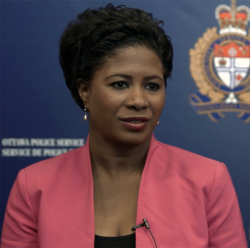Wednesday 29 November
June Girvan, an elder in Ottawa’s black community, opened a symposium Wednesday by blowing a special African horn, filling the atrium of Ottawa City Hall with a muffled sound not unlike that of a harmonica.
The Jamaican-Canadian was issuing, she explained to the audience, a call to action — a call for the community to “come together to act in the best interest of the whole.”
It was in that spirit that about 40 people spent the day discussing how members of the black and newcomer communities in Ottawa could become better informed about and connected to city and community services.

It was a point driven home by Mayor Jim Watson, who began his remarks by saying: “Welcome to your city hall.”
Whenever he visits a school, particularly in the urban and suburban parts of the city, the mayor said it often resembles a “mini United Nations” because the students come from so many different countries. “That is the reality of the new face of Ottawa.”
Indeed, the last census reported about 23 per cent of Ottawa residents are visible minorities, but the same ratio is not reflected on the city’s volunteer agencies, boards and advisory committees, and there are few visible minorities leading community associations and Business Improvement Areas, Watson said.
“We’re not being reflective of what the statistics are out there and this is a first step to try to at least let leaders know.”
But getting the message out and actually taking concrete steps to create a level playing field so all citizens can participate are different things.
It’s important opportunities to join the transit commission, for example, are real — and reachable. If the position requires specific qualifications, it may not actually be fully available to people with lower incomes or less education, even if the person has the unique knowledge or perspective of a user, said Rawlson King, president of the Overbrook Community Association.
“I think there’s a deeper conversation that’s required.”
The lack of representation of visible minorities on volunteer agencies, boards and committees is a failure of the current system, he said, noting the city scrapped its equity and diversity advisory committee and doesn’t have a standalone equity and diversity division, as Toronto does.
“If we want inclusion, what substantive changes are we going to make to the system if we want to end systemic discrimination?” King asked.
“That will be the litmus test.”

In addition to panel discussions and a lunch spread provided by black-owned restaurants, Ottawa-area MPs Chandra Arya and Greg Fergus spoke.
Ketcia Peters, CEO of Caribbean Union of Canada, said organizers were hoping more people would attend. But she acknowledged a daytime event in the middle of the week presents a challenge for many in the black community who are working more than one job or taking care of their children.
Systemic barriers may also mean black people don’t hold positions of power at their places of employment and don’t enjoy flexible schedules that would allow them to step out to attend such an event.
Watson said he also would have liked a larger crowd, but was hopeful those who attended will spur their communities into action.
“I would have preferred to see 200 people here, but sometimes you have to start small and build.”
Source: Ottawa Citizen

